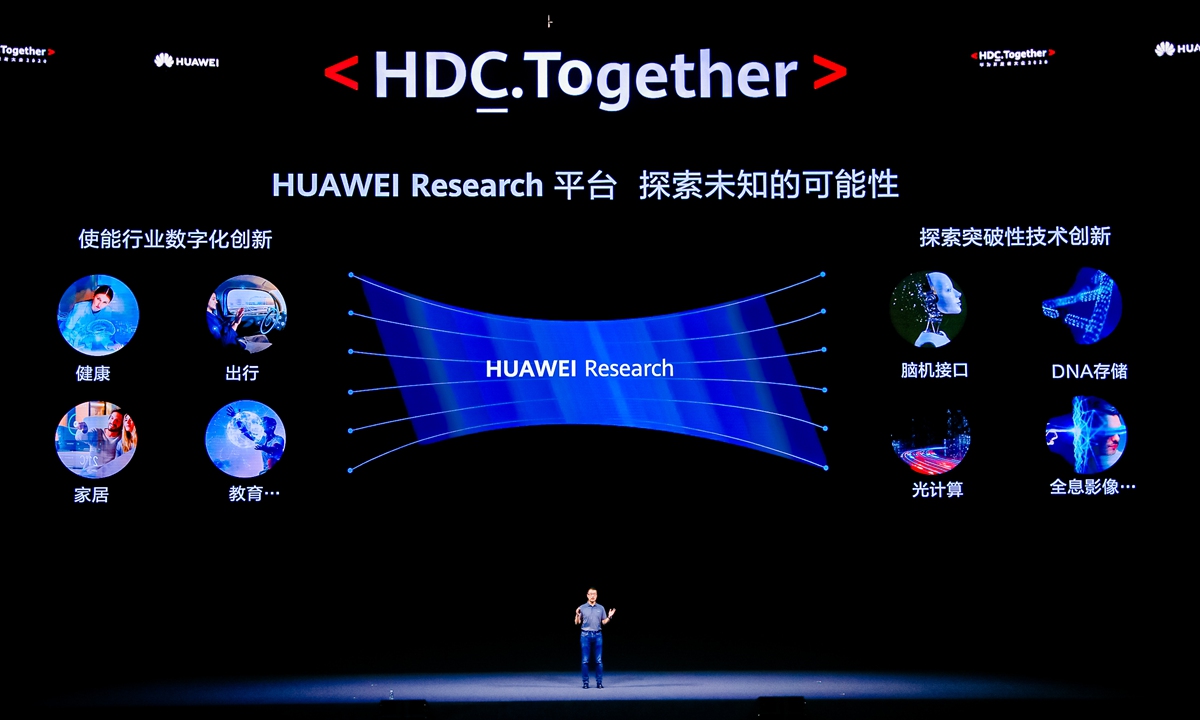Qualcomm may be next to get permission to supply Huawei: analysts
By Zhang Dan and Li Xuanmin Source: Global Times Published: 2020/9/22 19:52:22
Qualcomm may be next to get US permission

Photo: Courtesy of Huawei
Qualcomm may become the next company after Intel and Advanced Micro Devices Inc (AMD) to obtain a license from the US government to continue supplying some products to Huawei, considering the US semiconductor maker's huge investment in lobbying and the negative impact on its revenue, but any approval may come after the US presidential election in November, analysts said.
The US government's new ban prohibited domestic companies from supplying Huawei, effective September 15. So far, Intel and AMD have reportedly obtained special licenses to provide chips to Huawei.
Right after Intel received its license, it enhanced cooperation with Huawei on Tuesday by launching a new server series named FusionServer V6 to further promote the computing sector, Huawei told the Global Times.
The licenses for Intel and AMD, which mainly function as a relief for Huawei's laptop products, will not help with the company's smartphone segment, an industry observer who preferred to be anonymous told the Global Times. When it comes to Huawei, the US' focus is on its 5G and smartphone businesses.
With a tech cold war brewing between the world's largest two economies, the Trump administration has spared no effort to squeeze out Huawei, which had successfully taken the global lead.
As to which company will come next, analysts said it would likely be Qualcomm, as the US company has maintained a good relationship with a number of US politicians and spent heavily on lobbying the US government.
"The company also needs to take account of the impact of cutting off supplies to Huawei on its revenue, and how the move could potentially create new rivals in the chip industry that will further erode its profitability," Fu Liang, a Beijing-based telecom industry expert, told the Global Times on Tuesday.
The US government ban and the tech cold war could jeopardize American semiconductor companies' ability to do business in China on an equal footing with their competitors, and these factors could dent the estimated $49 billion of revenue that the US semiconductor industry derived from Chinese device manufacturers, according to a Boston Consulting Group report in March.
Concerns are already showing up in Qualcomm's sliding share and profits in the Chinese market, which accounted for about 65 percent of the US company's revenue, Bryan Wong, principal researcher at the Suning Institute of Finance in Nanjing, East China's Jiangsu Province, told the Global Times in a previous interview.
Another US chipmaker - Micron Technology - is also expected to get a license to sell chips to Huawei, "because Micron wouldn't allow its stock to continue dropping like it did after the ban," said Zhou Xibing, a financial writer who follows Huawei closely.
Huawei accounted for 12 percent of Micron's revenue in 2019, media reports said.
However, Taiwan Semiconductor Manufacturing Co (TSMC), among others, could have a hard time in getting a license, as its products fall into the scope of Washington's plot to cut off key component supplies to Huawei in a bid to curb its 5G development, observers said.
Qualcomm's high-end chip could be an alternative to that of TSMC, which means if Huawei could secure supplies from Qualcomm, its smartphone business will survive, according to Fu.
It will also be extremely difficult for Shanghai-based Semiconductor Manufacturing International Corp (SMIC) to gain a license from the US, as the company is a Chinese company and Washington claimed it has relations with the Chinese government, analysts said.
As most chipmakers filed applications with the US Department of Commerce just ahead of the chip ban deadline, the chances that they could receive licenses prior to the US presidential election are "very slim," Fu predicted.
"But in the short term, the impact on Huawei's mobile business is limited as the company has stockpiled about half a year's worth of crucial chips," Fu said.
China's long-anticipated unreliable entity list, the provisions of which were released over the weekend, could also sound an alarm to chipmakers and prompt them to scale up efforts to obtain licenses, according to analysts.
Newspaper headline: Chipmakers long for licenses